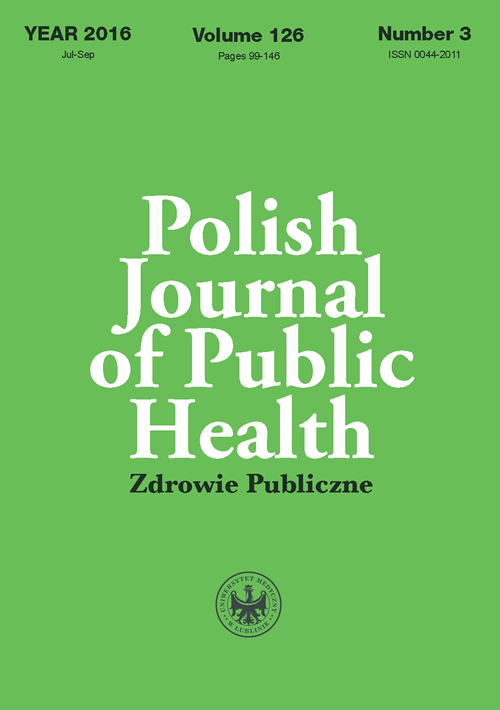Do medical students have a positive outlook on the world?
DOI:
https://doi.org/10.1515/pjph-2016-0026Keywords:
responsibilities, students, teaching load, stressAbstract
Introduction. Upon entering diverse fields of medical science, young people are on the cusp of adulthood. They change their environment and take on new responsibilities, which often translates to stress and depression.
Aim. The main objective of the work was to assess the psychological health in students of Medical University of Lublin.
Material and Methods. The research tool was a questionnaire containing information regarding mental health of first-year students of medicine. The results were statistically analysed in Statistica 11.0, utilising Pearson’s Chi Squared test of independence, with significance set at p<0.05.
Results. Most respondents (55.79%), whether male or female, rarely feel sadness. About 43% of respondents replied that they employ different strategies of coping with stress. 33.47% of all students stated that whenever any problems appear they look for support from their families. Generally, around 47% of all students are happy with their lives. There were, statistical signification between the sex of the students and psychological well-being, and between the sex and the ways of dealing with depression.
Conclusions. Despite the significant stress to which these young people are exposed, they are relatively strong mentally and have a positive outlook towards the lives.
References
1. McDowell I. Measures of self-perceived well-being. J Psychosom Res. 2010;69:69-79. doi:10.1016/j.jpsychores.2009.07.002.
2. Park H, Suh BS, Kim WS, et al. Character profiles and life satisfaction. Compr Psychiatry. 2015;58:172-7. doi: 10.1016/j.comppsych.2014.12.013.
3. Lyubomirsky S, Sheldon KM, Schkade D. Pursuing Happiness: The Architecture of Sustainable Change. Rev Gen Psych. 2005;9,(2):111-31. doi: 10.1037/1089-2680.9.2.111.
4. Nacar M, Baykan Z, Cetinkaya F, et al. Health promoting lifestyle behaviour in medical students: a multicentre study from Turkey. Asian Pac J Cancer Prev. 2014;15(20):8969-74. doi:10.7314/APJCP.2014.15.20.8969.
5. Rogers ME, Creed PA, Searle J. Person and environmental factors associated with well-being in medical students. PAID. 2012:52:472-7. doi:10.1016/j.paid.2011.11.006.
6. Slonim J, Kienhuis M, Di Benedetto M, Reece J. The relationships among self-care, dispositional mindfulness, and psychological distress in medical students. Med Educ Online. 2015;20:27924. doi: 10.3402/meo.v20.27924.
7. Srivastava K, Raju MSVK, Saldanha D, et al. Psychological well-being of medical students. MJAFI. 2007;63:137-40.
8. Millan LR, Azevedo RS, Rossi E, et al. What is behind a student’s choice for becoming a doctor? Clinics. 2005;60,(2):143-50.
9. Kusurkar RA, Croiset G, Galindo-Garré F, Cate OT. Motivational profiles of medical students: Association with study effort, academic performance and exhaustion. BMC Med Edu. 2013;13(87). doi: 10.1186/1472-6920-13-87.
10. Yusoff MSB, Esa AR, Pa MNM, et al. A Longitudinal study of relationships between previous academic achievement, emotional intelligence and personality traits with psychological health of medical students during stressful periods. Education for Health. 2013;26(1). doi: 10.4103/1357-6283.112800.
11. O’Rourke M, Hammond S, O’Flynn S, Boylan G. The medical student stress profile: a tool for stress audit in medical training. Med Edu. 2010;44:1027-37. doi:10.1111/j.1365-2923.2010.03734.x.
12. Szczepańska J, Klin Z, Jaroszewska A, Ciesielski R. Zaburzenia nastroju w populacji studentów Wydziału Fizjoterapii AWF we Wrocławiu. Część 1. Fizjoterapia. 2008;16(3):69-78.
13. Białkowska J, Mroczkowska D, Zomkowska E, Rakowska A. Ocena zdro-wia psychicznego studentów na podstawie Skróconego Kwestionariusza Zdrowia Pacjenta. Hygeia Public Health. 2014;49(2):365-9.
14. Marek K, Białoń P, Wichowicz H, et al. Przesiewowa ocena rozpowszechnienia objawów depresyjnych i lękowych wśród studentów Akademii Medycznej w Gdańsku. Psychiatr. 2005;2(4):217-24.
15. Skrzypek M, Piątkowski W, Brysiewicz A, Wszędyrówny M. Analiza jakości życia studentów w kontekście stylu radzenia sobie ze stresem. Raport z badań. Annales UMCS. SECTIO I. 2001;24(21):261-75.
16. Centrum Badania Opinii Społecznej (CBOS), Komunikat z badań, Zadowolenie z życia, Warszawa; 2013. Availabe: www.cbos.pl/SPISKOM.POL/2013/K_001_13.PDF.
17. Główny Urząd Statystyczny, Subiektywny dobrobyt w Polsce w 2015 roku. 2015. Available: http://stat.gov.pl/download/gfx/portalinformacyjny/pl/defaultaktualnosci/5486/20/1/1/subiektywny_dobrobyt_w_polsce_w_2015r.pdf.
Downloads
Published
Issue
Section
License
Copyright (c) 2016 Polish Journal of Public Health

This work is licensed under a Creative Commons Attribution-NonCommercial-NoDerivatives 3.0 Unported License.


